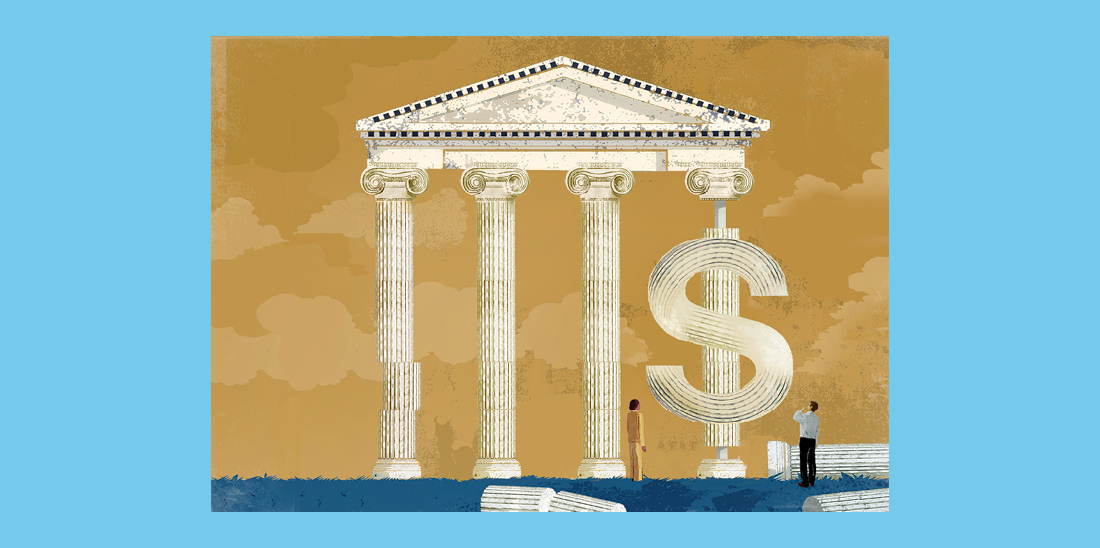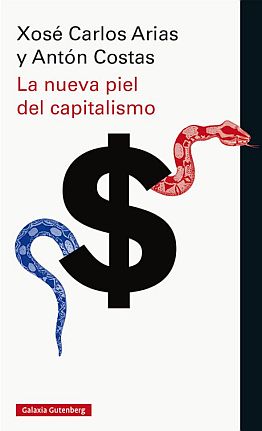There is an alternative, it is progressive capitalism
- Dossier
- Jul 19
- 14 mins

Is capitalism compatible with democracy and prosperity? The rise in inequalities in the early 21st century has had worrying implications in liberal democracies, which are suffering from the return of authoritarian populism. A new social contract is needed that democratises prosperity and makes inclusive capitalism possible.
The great disappointment
The market economy has stopped working for the benefit of one and all. The prosperity generated by capitalism is not inclusive. It only benefits a small few, a shrinking few. The figures are staggering. The works, among many others, of Anthony Atkinson, Branko Milanović, and Thomas Piketty cannot be contested or even refuted. Although global poverty has fallen in the last twenty years, global inequality and, in particular, inequality within countries, are on the rise. This applies to both developed and emerging countries, such as China. The outcome is the impoverishment of the poorest and the reduction of the middle classes in developed countries.
This return of inequalities has been a great disappointment to all those who believed in the promise of shared prosperity associated with the neoliberal experiment of the last three decades. In turn, it is bearing alarming consequences for liberal democracies because these inequalities are the ideal breeding ground for the return of political authoritarian populism.
The questions are therefore inevitable: Is capitalism compatible with prosperity for one and all? And, stretching beyond the economy, is capitalism compatible with democracy? Is there an alternative to this state of affairs? I think there is: it is inclusive capitalism.
Two facts back up the possibility of inclusive capitalism in the early 21st century. The first is that this type of progressive capitalism was effective during the Treinta Gloriosos (“Thirty Glorious Years”), from the end of the Second World War in 1945 to the 1973 oil crisis. Over that time, inequality was reduced, prosperity was widely shared, broad middle classes were formed and democracy spread. The reason behind that golden age of inclusive capitalism was the existence of the post-war Christian-social democratic social contract.
The second is that the rise in inequalities in the last thirty years has not been uniform across all developed countries. In some, as in the case of the United States and the United Kingdom, inequality in income and wealth distribution has returned to the levels of a century ago, in the years before the First World War. However, in other countries, particularly those in central and northern Europe, inequality in income and wealth has not increased at the same rate, and in some cases it has fallen. Therefore, like cholesterol, when it comes to capitalism, there is good (inclusive) and bad (unequal). Faced with the same circumstances of globalisation, technology, climate and demographic change, we find that there are countries that work more effectively than others when transforming growth into prosperity for all. Again, this different pattern is closely related to whether or not a social contract exists in each country that, through appropriate policies and institutions, turns prosperity into inclusive prosperity.
The political and economic elites that backed the neoliberal experiment promised their societies that the deregulation of domestic markets and globalisation would bring prosperity to one and all. But it soon became apparent that it was not.
Today, once again the challenge is to build a new social contract for the 21st century in our countries. A social contract that, besides restoring the incomes of the middle and working classes, allows both new social challenges – for instance, the new poverty among young people – and the challenges associated with technological change, climate change or the demography of longevity to be tackled.
In order to build this new social contract, we need, drawing on the term coined by Karl Polanyi, a “great transformation” that will civilise capitalism and reconcile it with social progress and democracy.
The landscape after the storm
To comprehend the surprise of the supporters of capitalism vis-à-vis this new era of inequalities, we must remember that the turn of the century was accompanied by high hopes. The political and economic elites that backed the neoliberal experiment, initiated in the late 1970s in the United Kingdom under Margaret Thatcher and in the United States under Ronald Reagan, promised their societies that the deregulation of domestic markets and globalisation would bring prosperity to one and all.
There were early signs that things were not going well for everyone. Real wages, and the participation of wages in national income, began to drop from the very outset of the neoliberal experiment. But it was the financial crisis of 2008 and the major economic recession that ensued that brought the social damages triggered by the experiment to the surface. As is the case when the tide goes out, the credit drought, the collapse of economic activity and the rise in unemployment revealed that, during the period of economic expansion and financial euphoria before the crisis, many people had been skinny-dipping. Those who had lost real income in the years prior to the crisis were able to uphold their living standards because debt allowed them to. When the credit tap ran dry and the debts could not be renewed, the nakedness of income was exposed.
Many thought, however, that once the recession passed and growth was restored, like when a glass is filled to the brim, economic recovery would overflow and make prosperity benefit one and all. The surprise was to see how employee and worker salaries remained stagnant or were reduced, despite the recovery of economic activity, the growth of corporate profits and the soaring executive pay of upper-level management in corporations. Drawing on the sea metaphor once again, the recovery was like a rise in the tide that did not spread equally to all the boats. Some were run aground and many others were directly sunk by debt, unemployment and lack of income. This is the first major lesson the crisis taught us.
The second lesson is that the great financial and global corporate capitalism has gone adrift in a moral abyss. It is not insignificant that The Economist, the widely circulated and world-renowned liberal economic weekly, has been showing its concern for what it has called “The new age of corporate scandals”. The cascade of incidents related to morally questionable behaviour of varying nature by large corporations such as Boeing, Goldman Sachs, Facebook, Volkswagen, Monsanto, Bayer, Wells Fargo, Equifax, Purdue Pharma, Johnson and Johnson and the pharmaceutical Teva are just some examples. It might be tempting to consider them as individual incidents, without the existence of common cause. These are events that are due to factors such as human errors related to negligent or criminal behaviour. But succumbing to that temptation would be a mistake. The real explanation is that corporate capitalism has spun out of control and the corporate “genie” must be put back in the bottle.
The third lesson learned from the crisis is a result of the previous two. Social malaise with, on the one hand, inequality and lack of opportunities and, on the other, with the behaviour of corporate elites, is fuelling political authoritarian populism. In my opinion, it is socio-economic inequalities and not cultural identities that are not threatened or humiliated that are driving political populism. I will come back to this point later on.
“The great transformation”: a new social contract for the 21st century
If we agree on these three major lessons that the financial and economic crisis has taught us, then we will probably also agree that we need to bring about a “great transformation” of capitalism, in the sense given to the term by Karl Polanyi towards the mid-20th century. A great transformation that civilises capitalism and reconciles it with social progress and democracy.
The path to making this great transformation happen cannot only be paved by the redistribution of income and wealth generated by the economy through higher and better taxes and more and better social spending. The magnitude and nature of the distribution problem palpable in our societies can only be tackled if we take action in the phase prior to redistribution. In other words, if we work on how companies distribute the surplus among wages, salaries and dividends, and on how the markets operate when it comes to fixing the prices of goods and services purchased by households. If the prices of these goods and services are not competitive prices but monopoly prices, families’ disposable income will be drained, especially that of families with less income. In short, it is a question of prevention before cure. If we let the distribution problem continue to grow, the chance of curing it solely through redistribution will be impossible to address politically. Moreover, the State must once again assume a fundamental role in driving the growth and investments model towards a socially sustainable and environmentally friendly economy. A new “entrepreneurial state” in the words of the economist Mariana Mazzucato.
That being said, there is considerable room for improving redistribution. Contrary to what mainstream economists argued only a few years ago, and what was taught in economics faculties, a better distribution of income does not undermine growth. On the contrary, as the new data emerging from studies carried out at the IMF show, more egalitarian societies generate a healthier and more sustainable form of growth. The conclusion drawn by policies in this new epiphany with regard to the relation between equity and efficiency is that it is better to redistribute than to get back into debt.
The instrument for bringing about this transformation has to be a new social contract. This idea is making its way into different intellectual, ideological and political circles, both in Europe and in the United States. Explicitly or implicitly, it was highly prevalent in the European elections on 26 May.
 © Eva Vázquez
© Eva VázquezThe post-war social contract, which was so difficult to build and yielded such good results, has been breached. That contract set forth the commitment of those who did well in the market economy to those who risked lagging behind and not partaking in the prosperity generated by said economic system. Left-wing political forces and class unions, which until then had sought to defeat capitalism, agreed to lend legitimacy to the new Keynesian regulated capitalism provided that the conservatives and liberals accepted the creation of a new social state, with higher social spending and taxes. The aim was to make the principle of equal opportunities a reality and achieve an inclusive distribution of prosperity. This social contract fared very well during the thirty glorious years following the end of the war. Nevertheless, the contract’s glue began to dissolve as of the 1970s. As I pointed out above, from that time, new neoliberal currents challenged the welfare state. Ultimate bankruptcy came with the financial crisis of 2008. Austerity policies bore an undeniable impact on the four basic pillars of welfare: education, health, unemployment benefits and pensions. It should come as no surprise that anti-capitalist social and political forces emerged that question the market economy and globalisation.
Like in the 1930s, it is in the United States where innovative initiatives can best be identified in the field of the new social contract. The proposal put forward by the young congresswoman for the state of New York, Alexandria Ocasio-Cortez, concerning a Green New Deal, albeit containing questionable elements, constitutes a way forward. Remember the New Deal enacted by Franklin D. Roosevelt in the 1930s. A large group of North American economists (interestingly, 3,333), among whom are several Nobel Prize winners in economics and former chairs of the Federal Reserve, have signed a document that is a partial replica of some of the proposals presented by Ocasio-Cortez. We will almost certainly see how these two proposals gradually converge in a new social contract in the coming years.
Without a new social contract, the malaise of our societies will continue to be a breeding ground for political populism and nationalism.
This debate is also surfacing in Europe. But it has not featured similar proposals to the North American ones until now. However, something may be discerned in the speeches and proposals of the French President Emmanuel Macron. Spain also has to face this challenge in this new term. Either way, the underlying idea is that, without a new social contract, the malaise of our societies will continue to be a breeding ground for political populism and nationalism.
In addition to seeking shared prosperity, the new social contract has to allow two complementary purposes. On the one hand, reconciling capitalism with democracy. And on the other, reconciling capitalism and morality.
Capitalism and democracy
As capitalism has stopped working for the benefit of one and all, it has begun to clash with democracy. The rise of liberal and authoritarian political populism is directly linked to the deterioration of welfare and the future expectations of the middle and working classes.
Admittedly, populist, far-right political forces are using identity and cultural arguments to win electoral support. The rise of populism occurs in communities that feel their identity and culture are threatened by two types of policies of a liberal nature. On the one hand, tolerance towards immigration – which would jeopardise identities and force them to compete with immigrants for employment and state welfare benefits –; on the other hand, civil rights policies concerning minorities and tolerance in aspects such as abortion, homosexual marriage, or policies recognising animal rights, the protection of nature and the environment. It is noteworthy that these groups already used these identity and cultural arguments prior to the 2008 financial and economic crisis, but they had little electoral significance. Outrage over the management of the crisis was the reason why these groups began to increase their electoral support.
This empirical evidence leads me to argue that socio-economic causes are at the root of the social malaise that fuels the populist temptation. Inequalities and growing poverty in developed countries nurture feelings of disgruntlement, resentment, bitterness and anger. Not only inequalities in income and wealth, but also inequality in terms of opportunities, employment, wages, education, access to basic public services and, perhaps the most perverse kind, existential inequality that implies the premature death of poor people (below the average life expectancy). And finally, a form of inequality overlooked until now: territorial inequality.
 © Eva Vázquez
© Eva VázquezInequalities and growing poverty in developed countries nurture feelings of disgruntlement, resentment, bitterness and anger.
The critics of capitalism, insofar as they consider inequality to be at the very essence of capitalism, insist on the incompatibility between democracy and capitalism. But we must proceed slowly with these type of conclusions. As revealed by Torben Iversen, Danish political scientist at Harvard University, and David Soskice, British economist at the London School of Economics, in a recent study (Democracy and Prosperity, Reinventing Capitalism through a Turbulent Century), democracy and advanced market economy are symbiotic. Their combination has proved extremely successful for both of them in the past (Treinta Gloriosos), and may continue to be so in the future. The issue, as I said, is to bring that “great transformation” associated with a new social contract to fruition.
Capitalism and morality
The ultimate goal of the new social contract is to put markets at the service of society, and not society at the service of markets, as has happened in the last thirty years of experimenting with neoliberal policies of market deregulation. The moral objection to capitalism fundamentally arises from the questioning of markets. For many critics, markets are basically immoral. But that is not the case. Markets can be defended using the language of civic virtues. In fact, classical economists’ idea of the market is essentially egalitarian. A market can also be spoken of when the benefits of any transaction are reciprocal for all parties. If the transaction benefits one party and undermines the welfare of the other, we are no longer dealing with a market, but other forms of transaction: monopoly, oligopoly or the power of one of the parties.
Markets need moral limits, as Michael Sandel rightly points out. But that’s nothing new in economic analysis, although it seems to be today. The economy emerged very much linked to moral philosophy. In fact, the great classical economists, such as Adam Smith, were moral philosophers. The defence of “commercial society”, as the classical economists called capitalism in the beginning, was based on the notion that competitive markets, accompanied by the appropriate ethical and administrative institutions, promoted civic virtues. The Theory of Moral Sentiments by Adam Smith lies at the heart of the wealth of nations. Progressives have to defend Smith and not allow him, as has happened up to now, to be appropriated by those who use his name and the name of markets for their own benefit and not for the common good.
The great task for the progressives in the early 21st century is to moralise and civilise the capitalism that emerged from the neoliberal experiment of the last three decades. Only in this way will we be able to achieve inclusive prosperity. The political instrument is a new social contract.
Bibliography
Costas, A., El final del desconcierto. Un nuevo contrato social para España. Ed. Península, 2017.
Costas, A.; Arias, X. C., La nueva piel del capitalismo. Galaxia Gutemberg, 2016.
Iversen, T.; Soskice, D., Democracy and Prosperity. Reinventing Capitalism through a Turbulent Century. Princeton, 2019
Milanovic, B., Los que tienen y los que no tienen. Una breve y singular historia de la desigualdad global. Alianza Editorial, 2012.
Rodrik, D., Las leyes de la Economía. Aciertos y errores de una ciencia en entredicho. Deusto, 2014.
Tirole, J., Economía del bien común. Taurus, 2017.
Wilkinson, R.; Pickett, K., Desigualdad. Un análisis de la (in)felicidad colectiva. Taurus, 2018.
Recommended publications
 El final del desconcierto. Un nuevo contrato social para que España funcioneAntón Costas. Ediciones Península, 2017
El final del desconcierto. Un nuevo contrato social para que España funcioneAntón Costas. Ediciones Península, 2017 La nueva piel del capitalismoXosé Carlos Arias, Antón Costas. Galaxia Gutenberg, 2016
La nueva piel del capitalismoXosé Carlos Arias, Antón Costas. Galaxia Gutenberg, 2016
The newsletter
Subscribe to our newsletter to keep up to date with Barcelona Metròpolis' new developments




